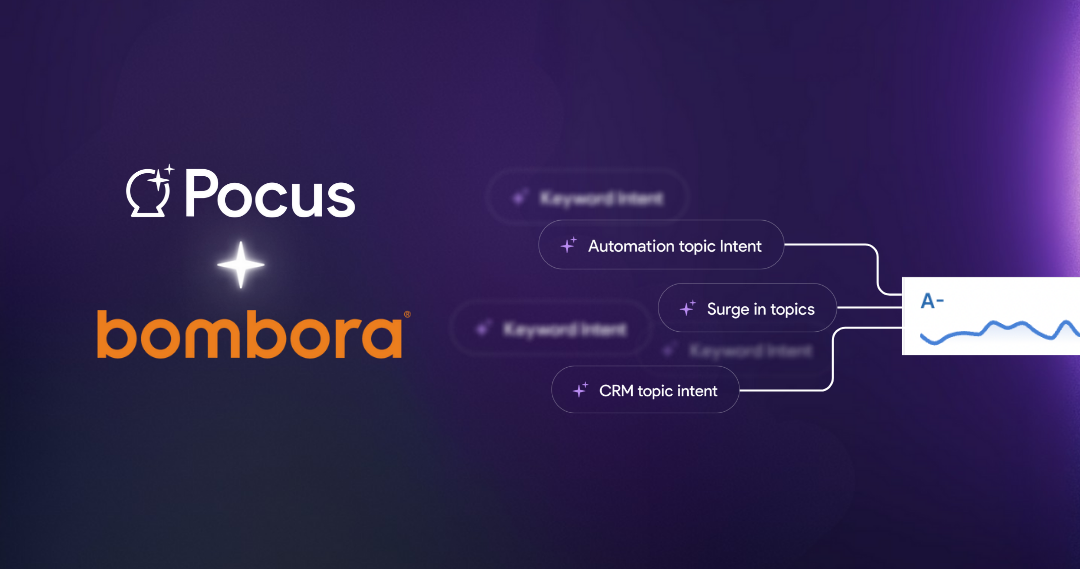You're reviewing Q4 pipeline with your sales team and the numbers aren't looking good. Your reps are busy—lots of activity, tons of calls logged, but conversion rates are dismal and deal velocity is crawling.
You dig deeper and discover the problem: your reps are spreading their time across 300+ accounts with no real prioritization strategy.
Your current scoring system shows Account A at 73, Account B at 68, Account C at 81... but nobody knows what those numbers actually mean. Your reps spend hours trying to decode the scoring logic, then give up and just start dialing randomly.
All while you’re best prospects showing real intent signals get buried in a sea of meaningless numbers.
This is why scoring has become a pandora’s box no one wants to touch.
RevOps painstakingly builds scores. Scores don’t pass the rep gut check. Reps just skip prioritization entirely and fall back to spray & pray.
Revenue suffers.
Sound familiar?
Well, we've built a new feature that replaces manual, black box scoring with something more magical, AI-driven, and passes the rep vibe check.
Continue reading to learn more about AI Scoring. Set up intelligent account scoring in minutes through AI conversation, get explainable account scores that actually mean something.
Black box scores are useless
The scoring game has become a nightmare of arbitrary numbers and black box algorithms. If the goal of scoring is to help reps prioritize where they focus, most GTM teams would agree we’ve mostly failed to date.
The central problem with scoring today is a lack of transparency in what scores actually mean, the challenges of building a score that accurately reflects how reps prioritize their books, and the false notion that a single score can be effective across all segments and goals.
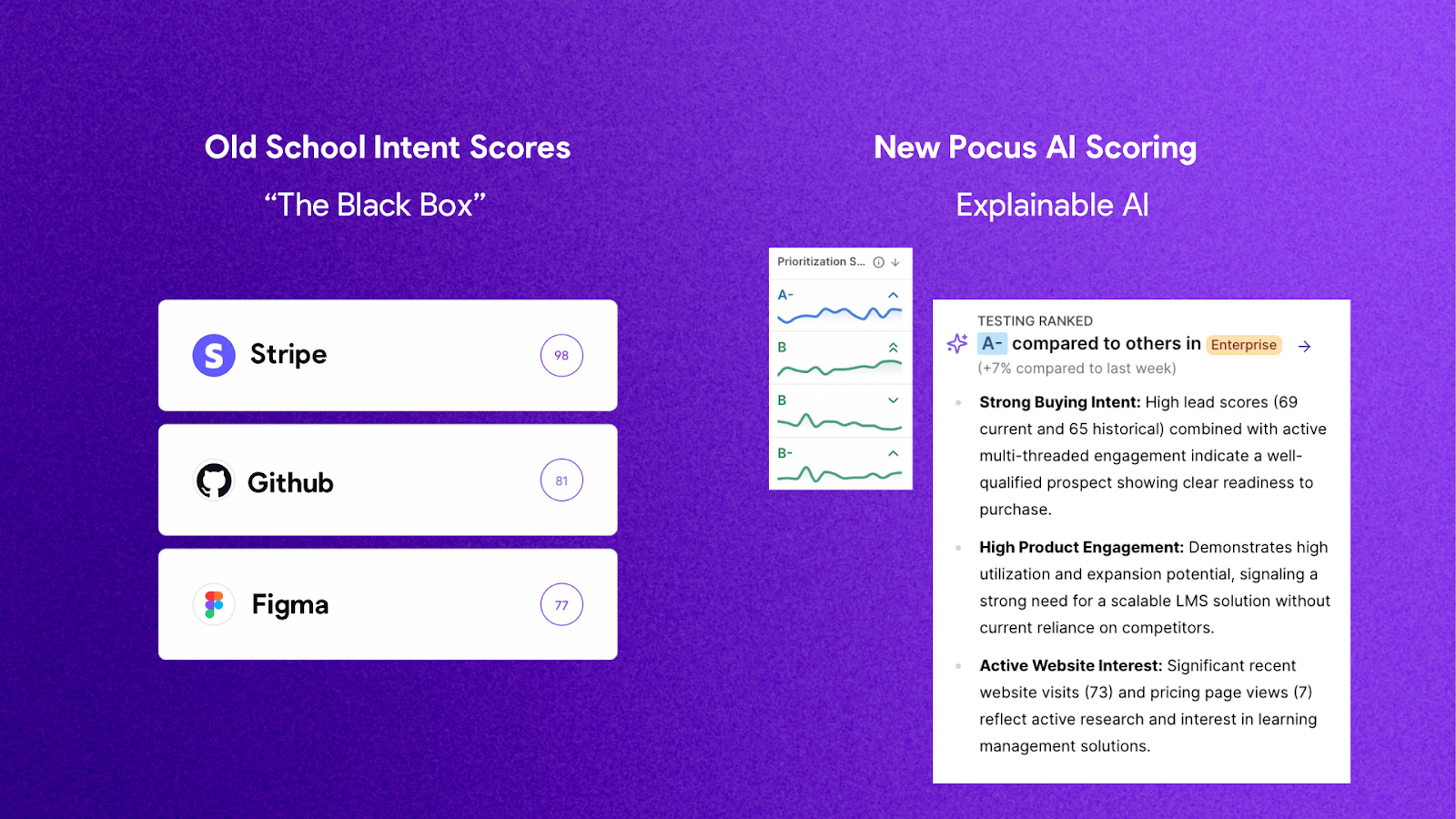
Here’s why traditional scoring fails:
- Reps don’t have context - Without real-time intent and activity insights, reps either see disjointed data scattered across tools or get a meaningless "89" score that tells them nothing about why they should call this account first.
- Peer comparison doesn't exist - Current scoring lumps all of your ICPs into one big fit category but doesn’t consider how you might prioritize between SMBs and enterprises. A score means nothing without relevant context for that market segment.
- Hard to build, slow to iterate - RevOps teams spend weeks to months on massive propensity-to-buy efforts that turn into costly data science projects with limited ability to quickly iterate.
Introducing AI Scoring
We built a scoring system that reps will actually use and trust.
Unlike traditional scoring, AI Scoring in Pocus is explainable and transparent so you can see the WHY behind every score, in plain english. And setup? Happens is minutes with our Scoring Agent. Simply use natural language to give the agent your instructions and let AI do the rest.
Traditional intent scores also often miss the granular signals that might matter the most. Our Scoring Agent taps into your first party data (call recordings, CRM, notes, product usage, recent activity), third party data (intent signals, job changes), and even AI research (recent announcements, 10Ks) to build a comprehensive score.
Here’s what sets AI Scoring apart:
Grades that pass the gut check
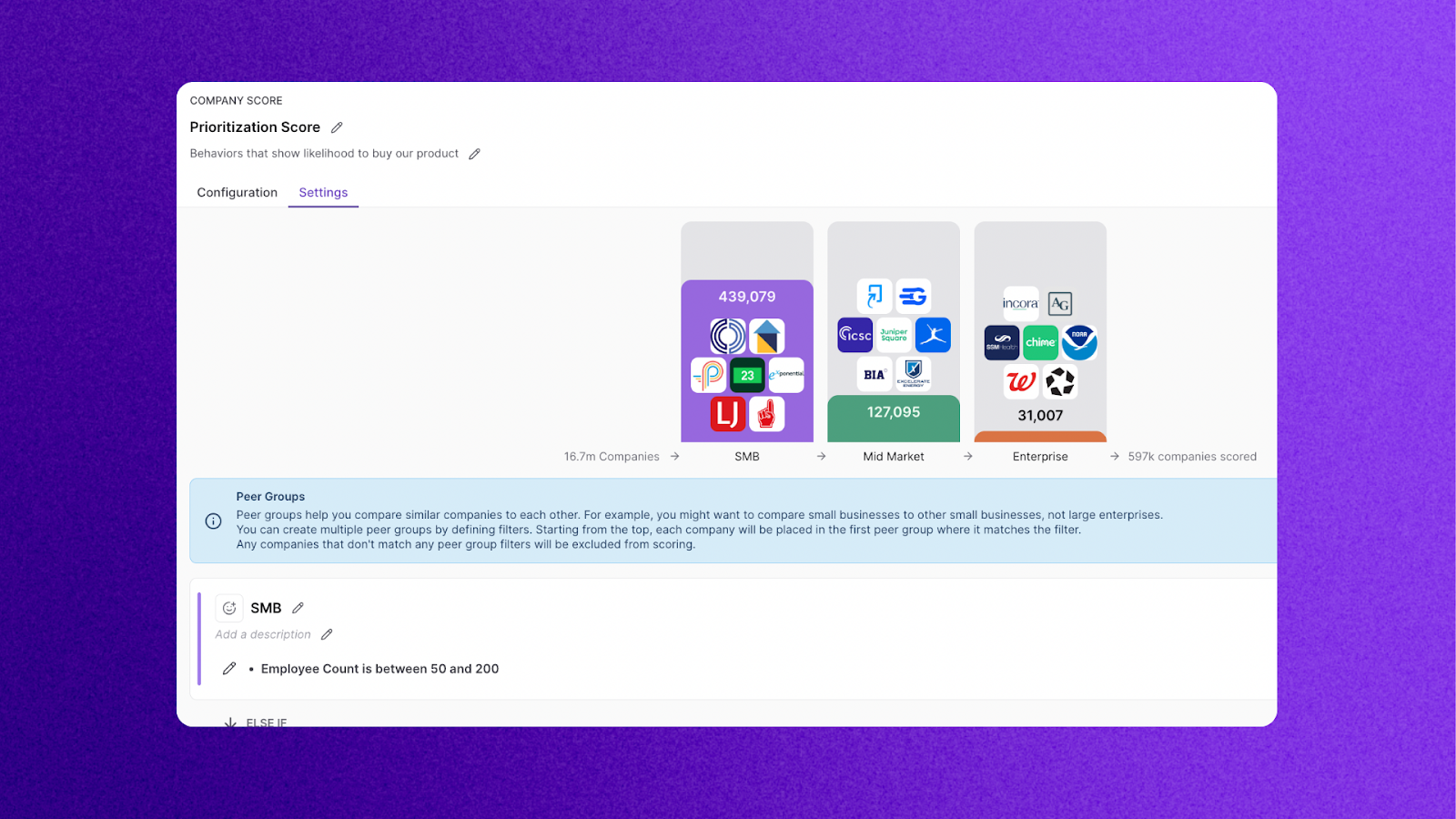
AI-Powered Scoring gives accounts grades that actually make sense by comparing apples to apples, not your entire database. Think "you got a B+ among mid-market SaaS segment" instead of a meaningless blanket "73" score. Our AI looks at each account in the context of your ICP segments not just a single ICP fit score which doesn’t understand the differences between an SMB fit vs. an Enterprise fit.
Catch hot accounts faster
AI Scoring also gives you visibility into trends, reps can see exactly when accounts are surging based on an increase in buying signals (visited your pricing page, attended a webinar) or relevant changes at the company (hired a new exec, launched a new product, funding announcement). Reps won’t miss their golden opportunities or chase cold accounts again.
Explainable AI, not a black box
Every score comes with clear explanations in plain English, so reps actually understand and trust the recommendations. Instead of mysterious algorithms, you get transparent reasoning:
"This account earned an A- because they're a 500-person fintech company (fits your ICP), recently visited your pricing page 4 times, and just posted 3 new engineering jobs (showing growth)."
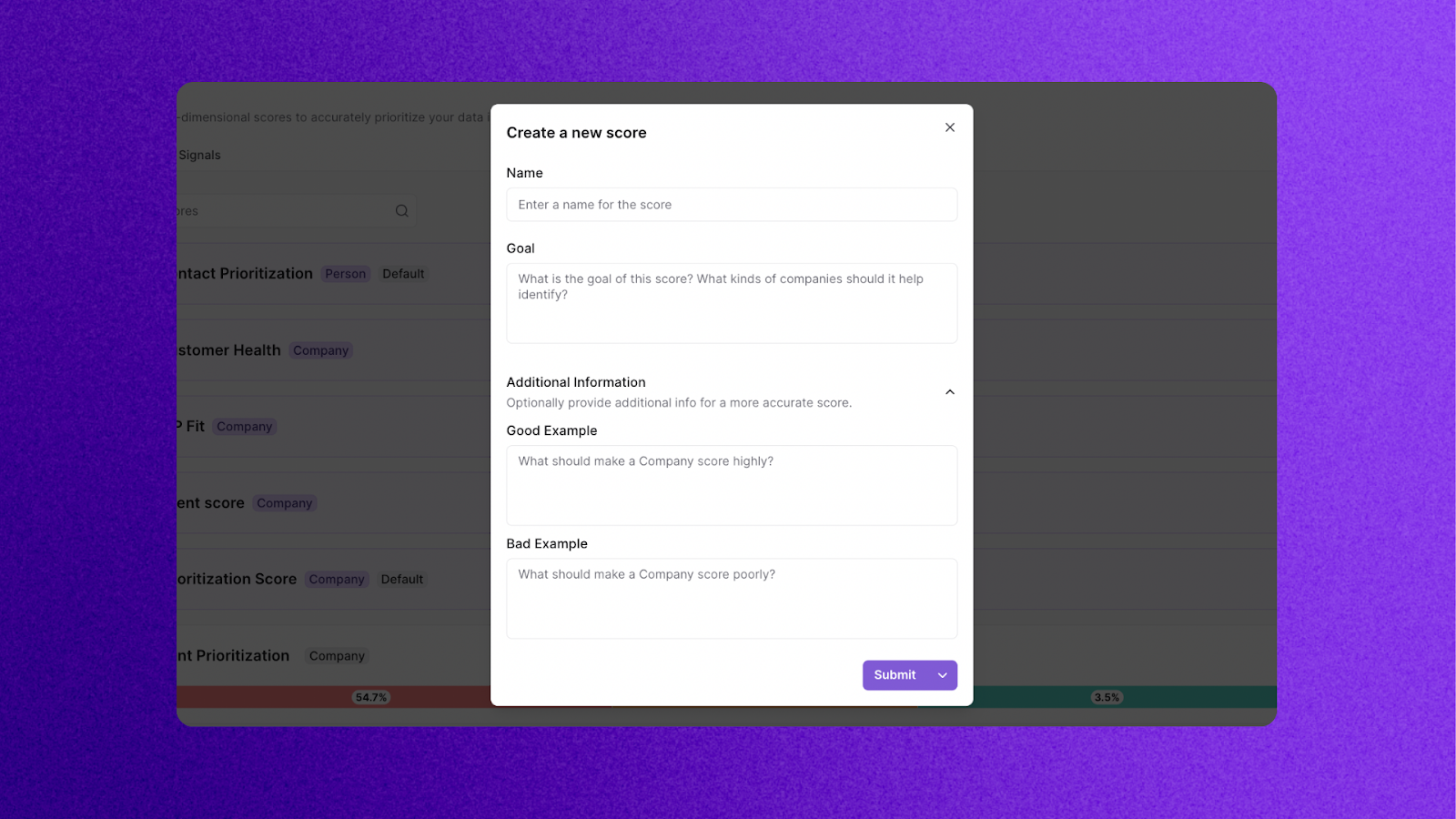
Setup in minutes, not months
AI agent for setup eliminates manual configuration, simply tweak the results and ship to your team. AI agent uses reasoning to determine which signals matter in the score and assign weights based on available data. As signals are added or updated the score changes in real-time, no manual work required.
How It Works
Building your next scoring model is as simple as 1-2-3:
1. Define your goal - Tell the Scoring Agent what you want to optimize for: ICP fit, intent signals, expansion opportunity, or contact prioritization. The AI guides you through a conversation to understand your specific use case.
2. AI builds your model - The system analyzes your customer data, intent signals available, AI events, and any other data in Pocus to identify success patterns, automatically select relevant signals and weights. No manual configuration required.
3. Start scoring instantly - Every account gets an A-F grade with detailed explanations. Watch scores update live as new signals arrive, get notified of surging accounts, and take immediate action on your highest-priority prospects.
Addressing the elephant
Let's be honest.
You're probably thinking "here we go again with another scoring system." We get it. You've been burned before. Maybe you spent three months building a lead scoring model in Salesforce that your reps promptly ignored. Or you're paying for another vendors predictive scoring that spits out numbers nobody understands or trusts.
Here's why AI Scoring is different, and why we're confident your team will actually use it:
"How is this different from Salesforce/HubSpot scoring?"
Traditional scoring systems—even the "AI-powered" ones—are still fundamentally black boxes that require you to manually configure dozens of variables, weightings, and thresholds. Then they give you a number that nobody can explain.
Pocus AI Scoring flips this entirely. Instead of asking you to become a data scientist, our AI agent has a conversation with you about your actual sales process. It automatically identifies the signals that matter for your specific business and explains every score in plain English
"How do you ensure reps actually use the scores?"
Because we solved the fundamental problem: trust and ability to action.
When a rep sees "Account scored 73," they have no idea if that's good, bad, or what action to take. When they see "Account graded A- because they're a 500-person fintech company (fits your ICP), visited pricing page 4x this week, and just hired a new VP of Engineering," they immediately understand why this account matters and what to do about it.
Our POV: The Great Simplification
We believe the future of sales isn't about using more tools—it's about consolidation, intelligence, and prescriptive guidance. AI Scoring is one more step towards that future, intelligent scoring that thinks like you do, guiding reps to prioritize their accounts based on real intent signals not best guesses. The best part? Reps can go from prioritized accounts to recommended contacts and even personalized outreach all in a few clicks within Pocus.
See AI-Powered Scoring in Action
Ready to stop guessing and start scoring with intelligence that actually makes sense?
Book a demo to see how you can use natural language to create scores your team will actually use.
.png)

.png)

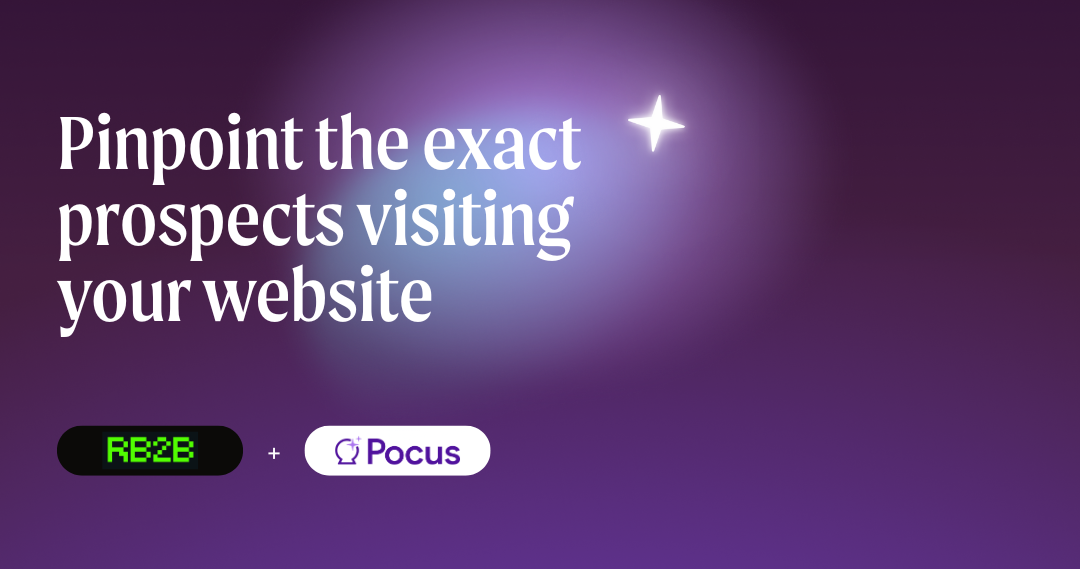
.png)
.jpg)
